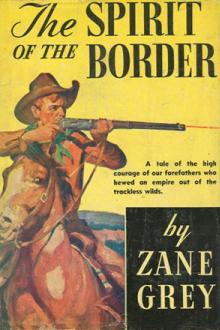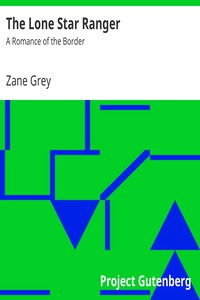The U. P. Trail, Zane Grey [robert munsch read aloud .txt] 📗

- Author: Zane Grey
Book online «The U. P. Trail, Zane Grey [robert munsch read aloud .txt] 📗». Author Zane Grey
“Neale, you’re more than usually excited to-day,” observed Hough. “Probably was the run of luck. And then you spouted to the women.” Neale confessed his offer to Ruby and Larry, and then his own impulse.
“Ruby called me a fool—crazy—a sky-pilot. Maybe I am.”
“Sky-pilot! Well, the little devil!” laughed Hough. “I’ll gamble she called you that before you declared yourself.”
“Before, yes. I tell you, Hough, I have crazy impulses. They’ve grown on me out here. They burst like lightning out of a clear sky. I would have done just that thing for Ruby.... Mad, you say?... Why, man, she’s not hopeless! There was something deep behind that impulse. Strange—not understandable! I’m at the mercy of every hour I spend here. Benton has got into my blood. And I see how Benton is a product of this great advance of progress—of civilization—the U. P. R. We’re only atoms in a force no one can understand.... Look at Reddy King. That cowboy was set—fixed like stone in his character. But Benton has called to the worst and wildest in him. He’ll do something terrible. Mark what I say. We’ll all do something terrible. You, too, Place Hough, with all your cold, implacable control. The moment will come, born out of this abnormal time. I can’t explain, but I feel. There’s a work-shop in this hell of Benton. Invisible, monstrous, and nameless!... Nameless like the new graves dug every day out here on the desert.... How few of the honest toilers dream of the spirit that is working on them. That Irishman, Shane, think of him. He fought while his brains oozed from a hole in his head; I saw, but I didn’t know then. I wanted to take his place. He said, no, he wasn’t hurt, and Casey would laugh at him. Aye, Casey would have laughed!.... They are men. There are thousands of them. The U. P. R. goes on. It can’t be stopped. It has the momentum of a great nation pushing it on from behind.... And I, who have lost all I cared for, and you, who are a drone among the bees, and Ruby and Stanton with their kind, poor creatures sucked into the vortex; yes, and that mob of leeches, why we all are so stung by that nameless spirit that we are stirred beyond ourselves and dare both height and depth of impossible things.”
“You must be drunk,” said Place, gravely, “and yet what you say hits me hard. I’m a gambler. But sometimes—there are moments when I might be less or more. There’s mystery in the air. This Benton is a chaos. Those hairy toilers of the rails! I’ve watched them hammer and lift and dig and fight. By day they sweat and they bleed, they sing and joke and quarrel—and go on with the work. By night they are seized by the furies. They fight among themselves while being plundered and murdered by Benton’s wolves. Heroic by day—hellish by night.... And so, spirit or what—they set the pace.”
Next afternoon, when parasitic Benton awoke, it found the girl Ruby dead in her bed.
Her door had to be forced. She had not been murdered. She had destroyed much of the contents of a trunk. She had dressed herself in simple garments that no one in Benton had ever seen. It did not appear what means she had employed to take her life. She was only one of many. More than one girl of Benton’s throng had sought the same short road and cheated life of further pain.
When Neale heard about it, upon his return to Benton, late that afternoon, Ruby was in her grave. It suited him to walk out in the twilight and stand awhile in the silence beside the bare sandy mound. No stone—no mark. Another nameless grave! She had been a child once, with dancing eyes and smiles, loved by some one, surely, and perhaps mourned by some one living. The low hum of Benton’s awakening night life was borne faintly on the wind. The sand seeped; the coyotes wailed; and yet there was silence. Twilight lingered. Out on the desert the shadows deepened.
By some chance the grave of the scarlet woman adjoined that of a laborer who had been killed by a blast. Neale remembered the spot. He had walked out there before. A morbid fascination often drew him to view that ever-increasing row of nameless graves. As the workman had given his life to the road, so had the woman. Neale saw a significance in the parallel.
Neale returned to the town troubled in mind. He remembered the last look Ruby had given him. Had he awakened conscience in her? Upon questioning Hough, he learned that Ruby had absented herself from the dancing-hall and had denied herself to all on that last night of her life.
There was to be one more incident relating to this poor girl before Benton in its mad rush should forget her.
Neale divined the tragedy before it came to pass, but he was as powerless to prevent it as any other spectator in Beauty Stanton’s hall.
Larry King reacted in his own peculiar way to the news of Ruby’s suicide, and the rumored cause. He stalked into that dancing-hall, where his voice stopped the music and the dancers.
“Come out heah!” he shouted to the pale Cordy.
And King spun the man into the center of the hall, where he called him every vile name known to the camp, scorned and slapped and insulted him, shamed him before that breathless crowd, goaded him at last into a desperate reaching for his gun, and killed him as he drew it.
21
Benton slowed and quieted down a few days before pay-day, to get ready for the great rush. Only the saloons and dance-halls and gambling-hells were active, and even here the difference was manifest.
The railroad-yard was the busiest place in the town, for every train brought huge loads of food, merchandise, and liquor, the transporting of which taxed the teamsters to their utmost.
The day just before pay-day saw the beginning of a singular cycle of change. Gangs of laborers rode in on the work-trains from the grading-camps and the camps at the head of the rails, now miles west of Benton. A rest of several days inevitably followed the visit of the pay-car. It was difficult to keep enough men at work to feed and water the teams, and there would have been sorry protection from the Indians had not the troops been on duty. Pay-days were not off-days for the soldiers.
Steady streams of men flowed toward Benton from east and west; and that night the hum of Benton was merry, subdued, waiting.
Bright and early the town with its added thousands awoke. The morning was clear, rosy, fresh. On the desert the colors changed from soft gray to red and the whirls of dust, riding the wind, resembled little clouds radiant with sunset hues. Silence and solitude and unbroken level reigned outside in infinite contrast to the seething town. Benton resembled an ant-heap at break of day. A thousand songs arose, crude and coarse and loud, but full of joy. Pay-day and vacation were at hand!
“Then drill, my Paddies, drill! Drill, my heroes, drill! Drill all day, No sugar in your tay, Workin’ on the U. P. Railway.”Casey





Comments (0)